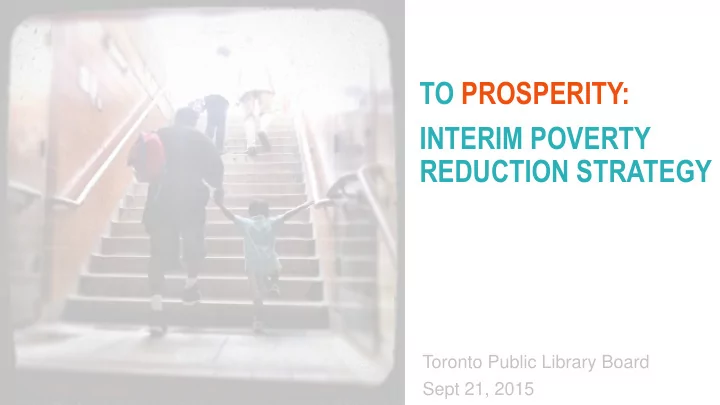

TO PROSPERITY: INTERIM POVERTY REDUCTION STRATEGY Toronto Public Library Board Sept 21, 2015
46% of Recent Immigrants live in poverty 37% of Female Lone Parents live in poverty 33% of People in Racialized Groups live in poverty 30% of People with Disabilities live in poverty 37% of Aboriginal People live in poverty
Vision Toronto will: address the issues create solutions drive systemic change By 2035, Toronto is a city with opportunities for all; a leader in the collective pursuit of justice, fairness and equity. We want to be renowned as a city where everyone has access to good jobs, adequate income, stable housing, affordable transportation, nutritious food, and supportive services.
Objectives Address Immediate Needs Ensure vital services are well funded, co-ordinated, and meet the immediate needs of those living in poverty Create Pathways to Prosperity Improve the quality of jobs in the city, attract investments to low- income areas, and ensure that City programs and services are integrated, client-centered, and focused on early intervention Drive Systemic Change Create a more accountable and participatory government that integrates reducing poverty and inequality as part of day-to-day business and decision making
Six Areas of Focus 1. Housing Stability 2. Access to Services 3. Transportation 4. Food Access 5. Quality Jobs and Living Wages 6. Institutional Change
Access to Services Are we providing the services people need or the services easiest for us to provide? Cities provide many vital services to their residents, including library services. Services must be provided in the right amount, so people’s basic needs are met. They should be widely promoted, so everyone knows about them. They should be easy to access, so everyone can participate. The City can do more to make services available, effective, and to meet existing and emerging needs.
Access to Services RECOMMENDATION 4. Adopt an integrated service approach and ensure all staff and community partners have the tools to help people navigate the social service system. ACTIONS: 4.1 Expand Digital Access and Literacy to ensure residents can effectively access programs and services online 4.2 Ensure user fees do not create barriers for low-income users 4.3 Develop non-monetary penalties that instill responsible use of resources but do not discourage low-income users from accessing services 4.4 Implement a new registration process for all City programs, not limited to recreation, that ensures the system is accessible, fair and equitable for low-income users 4.5 Promote health services to residents and clients of City programs and services 4.6 Create collaborative communication practices that ensure information is co-ordinated, consistent, accurate, and timely 4.7 Train staff and partners on the new collaborative communication and co-ordination practices and develop customer service standards based on the revised expectations
Access to Services RECOMMENDATION: 5. Ensure all programming for children and youth is integrated, inclusive and responsive to current needs. ACTIONS: 5.1 Leverage the resources provided by the Province by committing to a matching ratio that supports child-care fee subsides from the tax base 5.2 Ensure the existing equity model for child-care fee subsidies is nimble enough to match the subsidy allocation with child-care spaces available 5.3 Incubate flexible child-care models that align with the current labour market reality 5.4 Explore all opportunities to increase the number of licensed child-care spaces across the city 5.5 Provide a range of accessible, high-quality, out-of-school-time programs for children and youth in neighbourhoods across the city
Access to Services RECOMMENDATION: 6. Work across the health and social services sectors to create a seamless support system that takes into account the social determinants of health. ACTIONS: 6.1 Plan with funded agencies as partners, recognizing they operate programs and services that are the foundation of Toronto’s service system. 6.2 Stabilize funding for quality community-based programs 6.3 Review criteria for means-tested supports to ensure children have access to stable, quality programs 6.4 Align the intake and management of all means-tested services 6.5 Actively provide input to other orders of government on policies related to hospital care, home care, and corrections and mental health services, including discharge procedures 6.6 Expand dental care for low-income people
www.toronto.ca/toprosperity Denise Andrea Campbell Social Development, Finance & Administration 416.392.8614 dcampbe6@toronto.ca
Recommend
More recommend